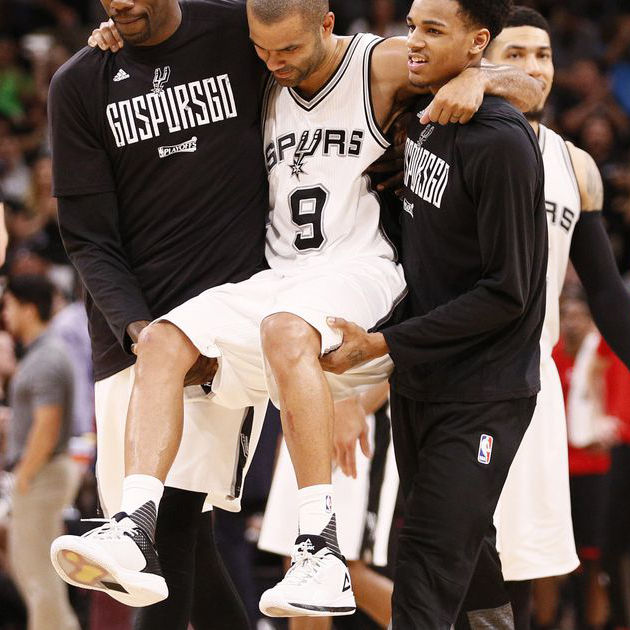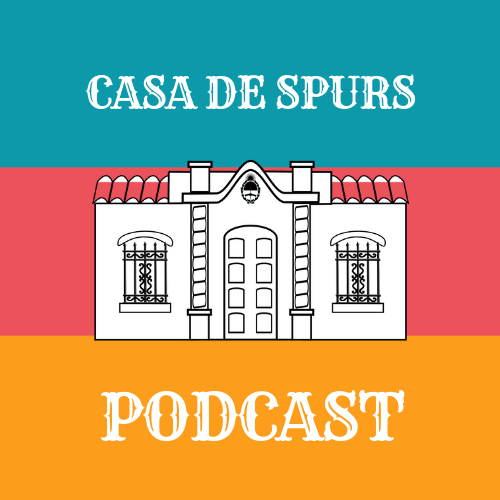2017 Western Conference Semifinals
San Antonio 121, Houston 96
Series tied 1-1
Let’s start with what we can control: let’s start with the game.
After the blowout in Game 1, we were all eager to see how the Spurs would respond. Would there be huge line-up adjustments? Strategic tweaks?
The big adjustment was starting Gasol in place of Lee, a move that doesn’t scream “genius stroke”. But it worked. There are a couple of things at play here. First, you could argue that the primary letdown in Game 1 was the defense. But against these Rockets, sometimes a better offense is what allows for better defense, by preventing transition and slowing the game down a bit. Want better D? Play better O. Gasol certainly helps that. While Lee is a great offensive player, he is not a floor spreader, while Gasol is (at least this season). So putting Gasol on the floor opens up the offense.
Second, if you’re going to go big, go big. Many people wondered if the Spurs would have to counter Houston by going small. But going small favors Houston greatly. The Spurs got here by being a big team; it’d seem foolish to abandon that one game in. Yes, there will be small-ball counters, but you have to keep your identity.
The problem with starting Lee is that he is not a big big. He plays inside, and he is crafty around the rim. But Gasol is big, tall, long, and everything else associated with being a “big”. While his reputation as a defender is poor, what that really means is that he doesn’t move well in space or defend on the perimeter well. But you know what he can do? Be big and tall and long around the rim. Much like late-career Duncan, he offers rim protection just by being tall and putting his arms straight up.
The Spurs seemed content to keep the bigs back and allow the Rockets to shoot the midrange shot they so loathe. With Gasol and Aldridge, the Spurs had the two biggest bigs out there, and were able to hold their own against the smaller Houston team.
Another way they took advantage of that size? Offensive rebounds. There are obvious advantages to being small and quick, particularly in today’s NBA, but it isn’t without sacrifice. Often, that sacrifice is rebounding. Defensive rebounds are important, but they don’t really stymie the opposing team’s offense. Offensive rebounds, on the other hand, slow down the opposing team’s offense and depress their defense. The Spurs grabbed 15 offensive rebounds, and were hounds on the glass, particularly late when they made their dominating push.
On offense, the ball also moved a lot better. This isn’t the 2014 Spurs, but this is the most they’ve looked like that team these playoffs. With 27 assists, the team found the right balance of movement and space with Kawhi dominating in isolation.
Speaking of Kawhi: he was a monster. He guarded Harden on one end, forcing him into one of his worst playoff games (all without committing a single foul). He scored 34 points on 16 shots. He had 7 rebounds and 8 assists. He had 3 steals and 1 block. He only committed 2 turnovers. He basically had the perfect game.
The defense looked better overall. More movement, more understanding, more connection. They held the Rockets to 34 threes (after giving up 50 in Game 1), often a better indicator than number made. They bothered Harden at nearly every turn, and didn’t overreact to some hot shooting from role players. Again, in that dominant 4th quarter run, they held the Rockets to 5 points over about a 9 minute span. That will win most playoff games.
Sadly, now we must get to the real headline of the game: Tony Parker’s injury. By now we know it’s a torn tendon in the quadricep that will require surgery and will likely sideline him for months.
Parker is a favorite punching bag of Spurs fans, but nobody wants to see this. Our hearts and sympathy go out to him. He might be the Spur we’re most critical of, but he is still a Spur, and he is still family. More than any other player on the team, we’ve grown up with Tony, watching him mature from a spry 19 year old into the crafty veteran he is today. Without getting into the long-term implications of this injury, we all wish a speedy recovery for him and we’ll be pulling for him the whole way.
We must dive into the immediate impact of this injury. Despite his up and down season, Parker was clearly the second best player in these playoffs. The Spurs basically went as he went. Outside of Game 4 against Memphis, when he played well, the Spurs won; he played poorly, the Spurs lost. Kawhi is the leader and dominant driving force; Parker is the bellwether.
We not only have to replace his production, we must replace his leadership. This is a team of veterans, but Tony was the guiding hand at the wheel in a way nobody else on this team has been, including Manu. Hopefully with the intelligence and heart on this team, there won’t be a vacuum created here.
His production is another story. Often when a player in injured, it’s not the back-up you worry about, it’s the back-up to the back-up. So whether he starts or doesn’t, Mills can fill a lot of Parker’s role. But then who fills Patty’s role?
Let’s start with the starters. In the regular season, we all know that Murray would get the start and Mills would stay on the bench. Will Pop still do that in the playoffs? It seems out of character for Pop to trust those Western Conference Semifinal starting minutes to a rookie. But we’ll see.
If not, Patty will get the start, and then Pop will be forced to rejigger his rotation to include more minutes for Simmons, Manu, and possibly Anderson. (Basically, bigger wing players who can handle the ball a bit.)
Either way, I expect Kawhi to get more time as the primary ball handler. But at what point are we asking too much of him. Guard Harden, score most of the points, and be the main ball handler and facilitator? That’s a lot.
Some outside the box options: Start Manu at PG. Late in the game, Pop went to strategy that I like to call medium ball. Go small, but with all wings (and one big). So you’re basically playing small (countering the Rockets small ball), but you’re still ‘bigger’ at every position. During the critical stretch, the lineup was Kawhi, Green, Simmons, Manu, and Pau or Aldridge. 4 wings and 1 big (bigger than any of their bigs). So at the PG matchup, Beverley was giving up size, and the Spurs were even or bigger at every other position. And yet, it’s still a team that can play fast and spaced.
Beverley is not a traditional PG (since Harden is the PG), so you don’t have to worry about guarding him in the traditional way. Manu could guard him. Or Green. Either way, there are favorable cross matches everywhere.
Another outside the box option: start Anderson. He basically played PG in college, and with Kawhi on the floor, you’d have two functional ball handlers.
The biggest question, outside of rotations, is playing time. Will Pop trust Murray? Or will Mills be the only PG that actually plays, and the rest will be hybrid big-small lineups?
Who is going to get more minutes? Manu should, but there is a limit to his effectiveness (though if ever there was a time for a vintage Manu stretch, this is it.) The way Simmons played in this game–his energy and athleticism were critical in that 4th quarter–I expect to see a lot more of him. This is the perfect match-up for his skills.
With Parker going down, the Rockets are likely favored the rest of the way. But I liked what I saw in Game 2, and I feel much better about our chances, with or without Parker. If we can steal one in Houston, this series gets very interesting.
Game 3 is Friday night.
Go Spurs Go.


